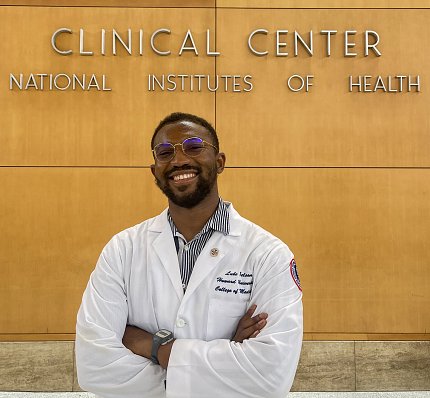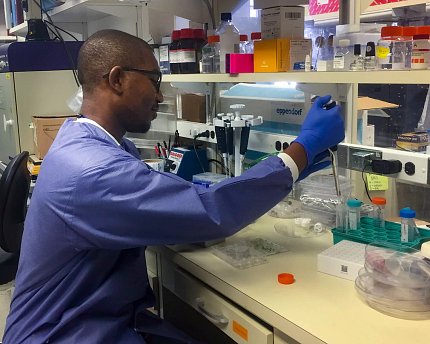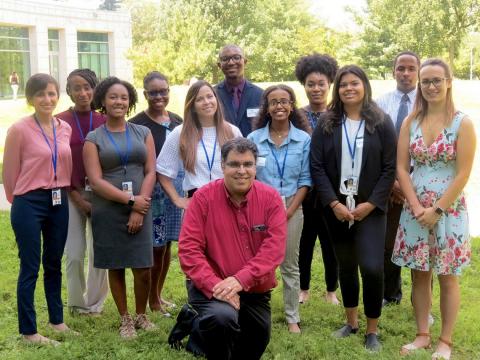DIVRO Returns Dividends
NEI Diversity Program Shines a Light on Nelson

On the journey from Miami’s Little Haiti to Howard University Medical School, Luke Nelson’s summer internship at the National Eye Institute has been a pivotal steppingstone. Nelson’s success is a feather in the cap of the initiative that helped get him there: the NEI Diversity in Vision Research and Ophthalmology (DIVRO) Program.
“You see me, but you are looking into the hands of so many people who have poured into me. People who have spent countless hours encouraging me, mentoring me… talking me off the ledge,” laughed Nelson, a third-year Howard University medical student and special volunteer in NEI’s Ocular Stem Cell and Translational Research Section (OCSTR).
Nelson grew up in Miami, the son of Haitian immigrants who moved to the U.S. in the late 1980s. His parents met while working at the Miami International Airport. At the time, his father was an aircraft mechanic; his mother a security worker. They are now a teacher and a respiratory therapist, respectively. Witnessing his parents pursue their true callings with resilience, Nelson said, inspired him to pursue his own, with passion and determination.
Nelson began his path to medical school at age 11 when his mother noticed him squinting at the television and took him to a Miami-area optometrist.
“I literally started to cry,” said Nelson, recalling when the optometrist corrected his vision, and the world came into focus. Relief that his eyes had nothing wrong with them, other than needing glasses, gave way to curiosity about vision; the optometrist offered to let Nelson shadow him in clinic.

Later, during high school, Nelson was shadowing an ophthalmologist at the Hollywood Eye Institute when he stumbled across a pamphlet about NEI’s DIVRO summer intern program on the NIH campus.
“Since 2011, DIVRO has given dozens of young people from communities underrepresented in biomedical research the opportunity to train at NEI,” said Dr. Cesar Perez-Gonzalez, who manages DIVRO. “We’re now reaping the rewards from this investment, as our earliest alumni are finishing graduate or medical school and entering the workforce in vision research.”
Nelson interned with NEI as an undergrad between his freshman and sophomore years at Columbia University. Under the mentorship of Dr. Mitra Farnoodian, and Dr. Kapil Bharti, he characterized function of a protein in the eye called ABCA4, which plays an important role in transporting waste out of the retina’s metabolically active photoreceptors and into the adjacent support tissue called the retinal pigment epithelium. Importantly, several inherited retinal diseases, like Stargardt disease, disrupt ABCA4 function, leading to vision loss. Understanding how these diseases affect ABCA4 can contribute to developing treatments to preserve vision for those affected.
While at Columbia, Nelson also became interested in public health, traveling to Haiti as part of a 4-month global health security fellowship to study infant mortality and maternal health.
“I jumped at that opportunity because this was my time to speak Haitian Creole, connect with my Haitian roots and also bridge together my passion for public health and research.” In Haiti, Nelson examined factors contributing to health disparities between rural and urban areas of the country.

After graduating from Columbia, Nelson entered medical school at Howard University. He is starting his third year this fall. Feeding his dedication to public health, he is now president of the Howard University College of Medicine Sight Savers Club, an ophthalmology special interest group that among other activities provides eye disease screening at local health fairs. As president, he hopes to bring back the Howard mobile eye clinic to the Metro Washington area.
Nelson is continuing his research with NEI’s Bharti as a special volunteer. He said he’s grateful for the experience and for the relationships he cultivated at the NIH, which he said helped open the door to medical school.
“Biomedical research is an inherently expensive enterprise. Unlike many things in our budget, our investment in people is appreciating,” said Bharti. “Programs like DIVRO help us provide opportunity to talented young people who otherwise might not find it. Thinking about Luke’s success, it’s easy to see now how the program benefits NEI and NIH.”
As for Nelson’s future, he has a strong desire to give back to his community. His goal is both simple and ambitious: “I believe everyone should have access to the best vision possible.”
For more about the DIVRO summer internship, see: https://go.nih.gov/SL21XrA.
